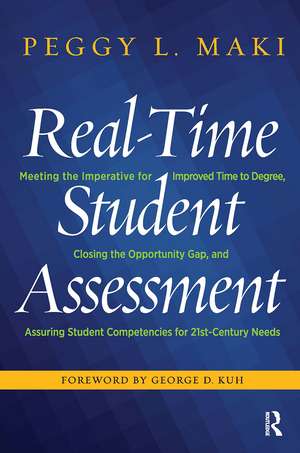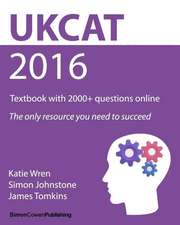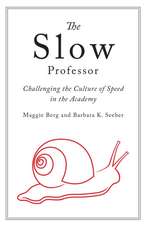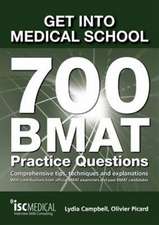Real-Time Student Assessment: Meeting the Imperative for Improved Time to Degree, Closing the Opportunity Gap, and Assuring Student Competencies for 21st-Century Needs
Autor Peggy L. Makien Limba Engleză Paperback – 15 feb 2017
| Toate formatele și edițiile | Preț | Express |
|---|---|---|
| Paperback (1) | 277.99 lei 6-8 săpt. | |
| Taylor & Francis – 15 feb 2017 | 277.99 lei 6-8 săpt. | |
| Hardback (1) | 999.79 lei 6-8 săpt. | |
| Taylor & Francis – 3 mar 2017 | 999.79 lei 6-8 săpt. |
Preț: 277.99 lei
Nou
Puncte Express: 417
Preț estimativ în valută:
53.20€ • 56.88$ • 44.35£
53.20€ • 56.88$ • 44.35£
Carte tipărită la comandă
Livrare economică 17 aprilie-01 mai
Preluare comenzi: 021 569.72.76
Specificații
ISBN-13: 9781620364888
ISBN-10: 1620364883
Pagini: 214
Dimensiuni: 152 x 229 x 15 mm
Greutate: 0.32 kg
Ediția:1
Editura: Taylor & Francis
Colecția Routledge
Locul publicării:Oxford, United Kingdom
ISBN-10: 1620364883
Pagini: 214
Dimensiuni: 152 x 229 x 15 mm
Greutate: 0.32 kg
Ediția:1
Editura: Taylor & Francis
Colecția Routledge
Locul publicării:Oxford, United Kingdom
Public țintă
PostgraduateNotă biografică
Peggy L. Maki, PhD in literature and linguistics, University of Delaware, writes, speaks about, and consults with higher education organizations and institutions on the process of assessing student learning, an internally motivated and shared commitment to currently enrolled students’ equitable progress toward achieving high-quality learning outcomes. She has consulted at over 610 institutions in the United States and abroad and has written books and articles on assessment for more than 20 years. Her previous book, Real-Time Student Assessment: Meeting the Imperative for Improved Time to Degree, Closing the Opportunity Gap, and Assuring Student Competencies for 21st-Century Needs (Stylus, 2017), challenges institutions to prioritize the use of chronological assessment results to benefit enrolled students compared with the more common practice of prolonged assessment cycles that generally benefit future students. She served as the former American Association for Higher Education’s (AAHE) senior scholar on assessment; a consultant in the Association of American Colleges & Universities’ (AAC&U’s) annual General Education and Assessment Institutes; and a member of several advisory boards, including one for the Lumina Foundation. Currently, she serves on the National Institute for Learning Outcomes Assessment (NILOA) advisory board. Recently an accredited organization in the United Kingdom invited her to design and teach online professional development courses and workshops among those it offers worldwide to higher education. She is the recipient of a national teaching award, the Lindback Award for Distinguished Teaching. George D. Kuh is Chancellor's Professor of Higher Education Emeritus at Indiana University and adjunct research professor of education policy at the University of Illinois.
Cuprins
Foreword by George D. Kuh Acknowledgments Introduction 1. Current and Projected Student Demographics. Why Equity Matters Now for Individuals and the Nation 2. Outcomes-Based Frameworks. Equity, Transparency, Quality, and Explicitness Appendix 2A. Critical Thinking VALUE Rubric Appendix 2B. Integrative Learning VALUE Rubric 3. The Canvas of Core Learner-Centered Commitments That Stretches Across an Outcomes-Based Framework 4. Guiding Principles of Real-Time Student Assessment at the Institution and Program Levels 5. Technology That Contributes to Real-Time Student Assessment Appendix 5. "All Play Means Something". Using Digital Learning Games and Simulations to Support Instructional Planning and Assessment 6. Approaches to Taking Real-Time Student Assessment to Scale References Index
Recenzii
"Maki’s book offers a strong foundation for faculty, staff, and administrators who are interested in strengthening their assessment practices at the institution and program levels. Indeed, she presents a convincing case that real-time assessment is a best practice, particularly for those seeking to improve the experiences of currently enrolled students."
Teachers College Record
“Peggy Maki, not surprisingly, again advances the practice and the fundamental reasons for engaging in assessment of student learning. Maki issues a clarion call for equity to be the center of our commitment for action. Her call is for timely action that produces the evidence of improved student learning, enhancing at every step both retention and completion, and quality of learning for success in life, work and lifelong flourishing.”
Terrel L. Rhodes, Vice President, Office of Quality, Curriculum and Assessment
Association of American Colleges and Universities
"Real-Time Student Assessment is the absolute best book on the market today for anyone engaged in student learning outcomes assessment. It is current, based on exhaustive research and actual practice, exemplified through multiple case studies and extensive references for follow-up. While assessment is typically required as part of regional, national and specialized accreditation, Maki demonstrates why real-time student assessment (RTSA) is different from many assessment practices, and provides both commentary on why RTSA is the most effective as well as step-by-step approaches on how to make assessment work for both faculty and students. I will be buying copies for many of my colleagues myself!"
Ralph Wolff, President, The Quality Assurance Commons for Higher and Postsecondary Education; former President
WASC Senior Accrediting Commission
From the Foreword:
“By the time results from traditional assessment approaches become available, a new academic term or year has begun, and faculty and students have moved on to a different set of academic expectations and challenges. In other words, the data that could inform and influence faculty and students to improve their performance come to the fore too late to be of consequence.
How can we obtain—in real time—information that can help advance the outcomes we desire?
Fortunately, this informative tome by Peggy L. Maki is just in time. Drawing on her vast, rich experience, Maki offers many instructive ideas, illustrated with concrete examples, about how to gather and use actionable information in real time about what students are and are not doing that will enable them to acquire and demonstrate the knowledge, proficiencies, and dispositions postsecondary institutions promise and employers expect of the twenty-first century learner and worker.”
George Kuh, Senior Scholar, National Institute for Learning Outcomes Assessment, and Chancellor’s Professor of Higher Education Emeritus
Indiana University
“Peggy Maki’s Real-Time Student Assessment has arrived just in time! As a higher education professional who has relied on Maki’s expertise and previous publications to inform my leadership for campus work for over a dozen years now, I am grateful that her new book rightfully challenges us to embrace real-time student assessment as an engaging and faculty-centered pedagogical practice. With a whole host of resources, strategies, and robust examples including ePortfolio implementation, Maki once again provides strong evidence and guidance for assessment reform on our campuses that, when brought to scale, will surely help us in our continuing quest to improve both student learning and time to completion for all the students we serve.”
Philip J. Sisson, Provost and Vice President of Academic and Student Affairs, Middlesex Community College
“This must-read, leading-edge, powerful volume challenges those in academe committed to increasing graduation rates, closing educational opportunity gaps, and enhancing quality learning, to move assessment to its critical next level—the integration of real-time student assessment into the fabric of the teaching and learning process. Maki concisely and eloquently details the demographic and assessment landscape, providing the backdrop for this imperative; provides concrete, in-depth case studies as guidance; and illustrates the ways in which technology can be harnessed to advance this initiative.”
Bonnie Orcutt, Professor of Economics, Worcester State University
Teachers College Record
“Peggy Maki, not surprisingly, again advances the practice and the fundamental reasons for engaging in assessment of student learning. Maki issues a clarion call for equity to be the center of our commitment for action. Her call is for timely action that produces the evidence of improved student learning, enhancing at every step both retention and completion, and quality of learning for success in life, work and lifelong flourishing.”
Terrel L. Rhodes, Vice President, Office of Quality, Curriculum and Assessment
Association of American Colleges and Universities
"Real-Time Student Assessment is the absolute best book on the market today for anyone engaged in student learning outcomes assessment. It is current, based on exhaustive research and actual practice, exemplified through multiple case studies and extensive references for follow-up. While assessment is typically required as part of regional, national and specialized accreditation, Maki demonstrates why real-time student assessment (RTSA) is different from many assessment practices, and provides both commentary on why RTSA is the most effective as well as step-by-step approaches on how to make assessment work for both faculty and students. I will be buying copies for many of my colleagues myself!"
Ralph Wolff, President, The Quality Assurance Commons for Higher and Postsecondary Education; former President
WASC Senior Accrediting Commission
From the Foreword:
“By the time results from traditional assessment approaches become available, a new academic term or year has begun, and faculty and students have moved on to a different set of academic expectations and challenges. In other words, the data that could inform and influence faculty and students to improve their performance come to the fore too late to be of consequence.
How can we obtain—in real time—information that can help advance the outcomes we desire?
Fortunately, this informative tome by Peggy L. Maki is just in time. Drawing on her vast, rich experience, Maki offers many instructive ideas, illustrated with concrete examples, about how to gather and use actionable information in real time about what students are and are not doing that will enable them to acquire and demonstrate the knowledge, proficiencies, and dispositions postsecondary institutions promise and employers expect of the twenty-first century learner and worker.”
George Kuh, Senior Scholar, National Institute for Learning Outcomes Assessment, and Chancellor’s Professor of Higher Education Emeritus
Indiana University
“Peggy Maki’s Real-Time Student Assessment has arrived just in time! As a higher education professional who has relied on Maki’s expertise and previous publications to inform my leadership for campus work for over a dozen years now, I am grateful that her new book rightfully challenges us to embrace real-time student assessment as an engaging and faculty-centered pedagogical practice. With a whole host of resources, strategies, and robust examples including ePortfolio implementation, Maki once again provides strong evidence and guidance for assessment reform on our campuses that, when brought to scale, will surely help us in our continuing quest to improve both student learning and time to completion for all the students we serve.”
Philip J. Sisson, Provost and Vice President of Academic and Student Affairs, Middlesex Community College
“This must-read, leading-edge, powerful volume challenges those in academe committed to increasing graduation rates, closing educational opportunity gaps, and enhancing quality learning, to move assessment to its critical next level—the integration of real-time student assessment into the fabric of the teaching and learning process. Maki concisely and eloquently details the demographic and assessment landscape, providing the backdrop for this imperative; provides concrete, in-depth case studies as guidance; and illustrates the ways in which technology can be harnessed to advance this initiative.”
Bonnie Orcutt, Professor of Economics, Worcester State University
Descriere
This book challenges institutions and their programs to prioritize the use of chronological assessment results to benefit enrolled students in comparison with the more common practice of prolonged assessment cycles that generally benefit future students.







